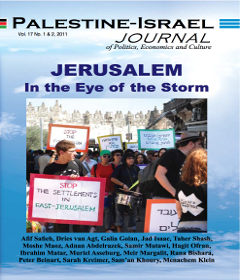The residents of Silwan, a Palestinian village adjacent to the Old City of Jerusalem, have learned in recent years that their best chance for sustaining their presence is through internal efforts.
Since 1967, when Israel occupied and extended its jurisdiction over East Jerusalem, the Jerusalem municipality has not invested in Silwan, home to more than 50,000 Palestinians. Although the residents of Silwan pay taxes, the money is not reinvested in their community. The village is underfinanced; it is plagued by poor infrastructure and experiences shortages in water and electricity. Building plans are not approved and there are no green parks, recreation centers, clean, paved streets or enough educational facilities. Silwan is not only in dismal condition; its people are also suffering as a side effect.
That is why in 2007, residents in the Silwan neighborhood of Wadi Hilweh established the creative center Madaa. Madaa, which in Arabic means "horizon," was chosen to represent the project whose mission is to build a strong, well-informed and involved Palestinian community and to provide educational and recreational courses for young people.
What Do You Love?"We asked them, 'What do you love? What do you want here?'" said Jawad Siyam, director of Madaa.
Originally, Madaa was targeted to the large youth population in Silwan, which makes up more than 50% of the population and 75% of whom live under the poverty line. Providing activities and education for the children appeared to be the greatest need, but Madaa eventually grew to fill other gaps in the community as well.
"Social life was completely broken in Silwan. The settlers invested a lot in order to have their objectives fulfilled," said Siyam. "Life here wasn't Western, it wasn't Oriental - it was something in-between. Relatives and neighbors [are] not speaking to each other; if there's a wedding, I find out by accident."
Relying on donations and volunteers, Madaa continues to expand, offering classrooms for art, languages, music, theater, creative writing, dancing, journalism, filmmaking and computer studies. There are rooms for women to gather to chat and to make traditional Palestinian crafts and mosaics to sell at local bazaars. Madaa also boasts the biggest library in the village and has a set of computers.
Instilling a Sense of HopeSome of the activities are a direct response to the negative effects of the political situation on the Silwan community. A few years ago, residents had enjoyed the natural spring for recreational use, until it was closed off for tourists. Swimming lessons are now offered twice a week to the men of Silwan at the 'Anata pool, with the help of a local swimming coach.
Not only does Madaa provide a creative outlet for the residents of Silwan who have lost much of their freedom for recreational pastimes, it also works to instill in the community a sense of hope, empowerment and pride in future generations. The non-violence learning center offers a leadership training program for teens and provides resources like books, essays, films and Internet access in order to teach and promote non-violence.
As settlers continue to slowly take chunks of Silwan, and the only investment by the municipality is the promotion of interest in tourism to the "City of David," the residents of Silwan challenge the political agendas by demonstrating community strength and tradition.
"Although the situation here is [such as it is] because of politics and settlers, we refuse support or money from any party or political agenda," said Siyam.
With 28 volunteers from within the village, and some from abroad, Madaa plans to continue fostering a sense of purpose in the community. And by raising flags in Palestinian colors that say "I love you Silwan" in both English and Arabic, it hopes to show that pride and love for one's home is the best reaction to adversity.
The Wadi Hilweh Information CenterWith the increase in settler provocations in Silwan, the local residents opened a Wadi Hilweh Information Center at the same location as the Madaa Center. In explaining their motivation, the founders of the center have written, "We, the residents of Wadi Hilweh, did not delegate anyone to convey the information on our behalf , and we do not allow any person to obscure our deep-rooted identity which lies in the houses, stones, trees, gardens, springs, and sky of our village…. We love this village as the baby loves its mother's milk…. We will tell the story and history of our village to all people without reservation, hesitation, intolerance, or racism. We are proud of the full history of our village and proud of being the owners of this beautiful legacy."
With this declaration and the continued activities at the Madaa and Wadi Hilweh Centers, the people of Silwan have signaled that they are not content to sit and play the role of helpless victims while their village crumbles and is swallowed up by settler expansionism.

